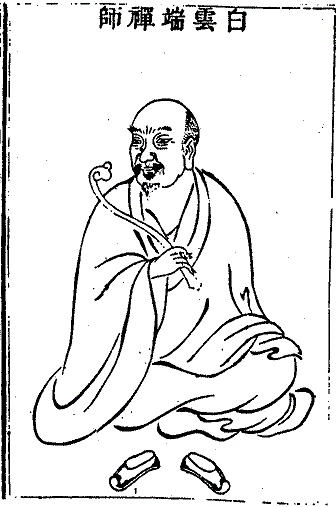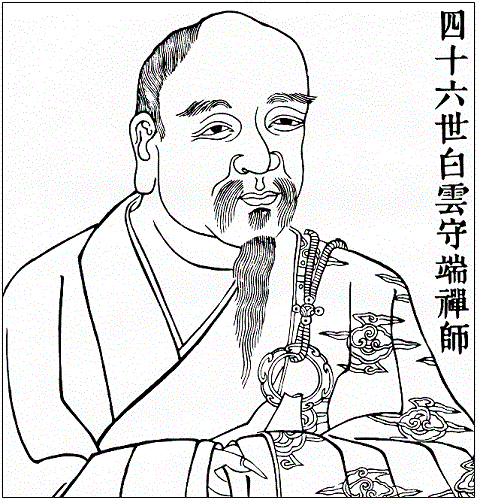ZEN IRODALOM ZEN LITERATURE
« Zen főoldal
« vissza a Terebess Online nyitólapjára

白雲守端 Baiyun Shouduan (1025–1072)
(Rōmaji:) Hakuun Shutan
Tartalom |
Contents |
| Paj-jün Sou-tuan mondásaiból Fordította: Terebess Gábor |
Baiyun Shouduan |
BAIYUN SHOUDUAN (1025–1072)
in: Historical Dictionary of Chan Buddhism by Youru Wang, 2017.
A Chan master of the Yangqi lineage of the Linji school in the
Song dynasty, Shouduan was a native of Hengyang (in present-day
Hunan province). His family name was Zhou. He started his monastic
life with the Chan master Renyu in Chaling. After studying with several
teachers, he became a disciple of Yangqi Fanghui and attained
enlightenment under Fanghui’s instruction. Inheritigg Fanghui’s
dharma lineage, he then took abbacy at a number of monasteries,
including Chengtian Temple in Jiangzhou, Zhengdao Temple at Mount
Fahua, Ganming Temple at Mount Longmen, and Haihui Temple at
Mount Baiyun. It was said that his preaching attracted huge crowds
and won him high regard. One of his great achievements was his
establishment of rules for the patriarch hall of a Chan monastery; for
example, he enshrined the ancient patriarchs Bodhidharma and
Baizhang Huaihai in the first place instead of just enshrining founding
abbots and their successors, which became the model for all Chan
monasteries throughout the Song and Yuan dynasties. Shouduan’s
teachings were preserved in the Baiyun Shouduan Chanshi Yulu (two
fascicles) and Baiyun Duan Heshang Guanglu (four fascicles). He had
many disciples, among whom Wuzu Fayan was the most famous. The
thriving of the Yangqi lineage is very much related to the success of
Shouduan and his disciples.
Baiyun Shouduan
by Andy Ferguson
In: Zen's Chinese Heritage: The Masters and Their Teachings, Wisdom Publications, 2011, pp. 428-431.
BAIYUN SHOUDUAN (1025–72) was a disciple of Yangqi Fanghui. He came from Hengyang (a city in Hunan Province). As a youth, he was skilled at scholarly arts. He received ordination at age twenty from a Zen master named Chaling You. He later traveled to study with Yangqi Fanghui, the great teacher of the Linji lineage, with whom he attained enlightenment. After spending a long period as Yangqi’s attendant, Baiyun traveled and taught at a number of different temples, everywhere gathering large crowds of students. He eventually lived and taught at Baiyun Mountain (located seventy kilometers east of Tongcheng County in Anwei Province). The Wudeng Huiyuan offers an account of Baiyun’s awakening.
One day Yangqi suddenly asked Baiyun, “Under what teacher were you ordained?”
Baiyun said, “Master Chaling You.”
Yangqi said, “I heard that he stumbled while crossing a bridge and attained enlightenment. He then composed an unusual verse. Do you remember it or not?”
Baiyun then recited the verse:
I possess a lustrous pearl
Long locked away by dust and toil.
Now the dust is gone and a light shines forth,
Illuminating myriad blossoms with the mountains and rivers.*
Yangqi suddenly laughed out loud and jumped up. Baiyun was shocked [by this behavior] so much that he hardly slept that night.
Early the next morning Yangqi questioned Baiyun about what had happened the night before. He asked, “Did you witness an exorcism last night?”
Baiyun said, “Yes.”
Yangqi said, “You don’t measure up to it.”
This startled Baiyun. He asked, “What do you mean?”
Yangqi said, “It enjoyed someone’s laughter. You fear someone’s laughter.”
[Upon hearing these words] Baiyun experienced great enlightenment.
Baiyun then served as Yangqi’s attendant for a long period of time. He (later) took leave of Yangqi and traveled to Yuantong Temple where, at the recommendation of [the abbot] Zen master Yuantong Na, he then assumed the abbacy of and taught at Chengtian Temple.201 There his reputation became widely known.
*
Zen master Baiyun Shouduan entered the hall and addressed the monks, saying, “In former times there was an assembly at Vulture Peak where the World-Honored One held up a flower, and Mahakashyapa smiled. The World-Honored One said, ‘I have The Treasury of the True Dharma Eye. I pass it to Mahakashyapa.’ This was then passed on in succession down to the present day.
“I say to this assembly that if it was really the true Dharma eye, then old Shakyamuni didn’t have it, and so how could he have passed it on? How could it have been transmitted? How can such a thing be said?
“In fact, each of you possesses the treasury of the true Dharma eye. But every day after you get out of bed, there’s ‘yes, yes,’ and ‘no, no,’ dividing up ‘south’ and ‘north,’ and other acts of bifurcation, all of which taken together are the light of the treasury of the true Dharma eye.
“When this eye opens, the entire universe and the great earth, the sun, moon, stars, and constellations, the myriad forms of the universe, though all right before your eyes, do not manifest a single bit of form. Before the eye opens, it is extinguished in the eyes of all people.
“Today it has already opened, and it is not limited to this place. But as to those of you for whom the eye has not opened; I don’t lack the ability, so I’ll open it and let you see.”
Baiyun then raised his hand with two fingers extended vertically and said, “Look! Look! If you can see it then it’s the same as I’ve said. If you can’t see it, then I’ll have to recite another verse:
The Treasury of the True Dharma Eye of each of you,
Cannot be matched by the thousand sages,
The line passes through you,
Brilliantly filling the great Tang.Mt. Sumeru walks into the sea,
In June a cold frost descends,
Though I speak of it thus,
No words can describe it.“Monks! I’ve spoken a mouthful. So why is it that no words can describe it?”
Baiyun then shouted and said, “Each of you has two places to see it!”
*
Baiyun said, “Old Shakyamuni recited four great vows, which were:
Though the myriad beings are numberless, I vow to save them;
Though defilements rise endlessly, I vow to end them;
Though Dharma gates are innumerable, I vow to study them;
Though Buddha’s way is unsurpassed, I vow to embody it.“I also have four great vows. They are:
When I’m hungry, I eat;
When it’s cold, I put on more clothes;
When I’m tired, I stretch out and sleep;
When it gets warm, I like to find a cool breeze.”*
Zen master Shouduan addressed the monks, saying, “The ancients have passed down a few words, and before we penetrate them they are like an iron wall. Suddenly, one day, after we see through it, we know that we ourselves are an iron wall. What can be done to see though this question?”
Master Shouduan also said, “An iron wall! An iron wall!”
*
Zen master Shouduan addressed the monks, saying, “If you go all out and really work up a sweat, then when you see a single stalk of grass a jade palace is revealed. But if you don’t put forth this type of effort, then even if you have a jade palace, a single stalk of grass will confound you. How can you really work up a sweat like this? As long as your two hands are tired, you’ll never dance gaily in the three palaces.”202
*
A monk asked Baiyun, “What is Buddha?”
Baiyun said, “A hot soup pot has no cool spot.”
*
A monk asked, “What is the great meaning of Buddhism?”
Baiyun said, “Push the gourd beneath the water.”
*
A monk asked, “Why did Bodhidharma come from the west?”
Baiyun said, “Birds fly, rabbits walk.”
*
A monk asked, “Praying to the holy ones, believing in one’s self—these are not the concerns of a monk. What are the concerns of a monk?”
Baiyun said, “Dead water does not conceal a dragon.”
The monk said, “And when it’s like that, then what?”
Baiyun said, “Gain kills you.”
Baiyun Shouduan's Dharma Lineage
[...]
菩提達磨 Bodhidharma, Putidamo (Bodaidaruma ?-532/5)
大祖慧可 Dazu Huike (Taiso Eka 487-593)
鑑智僧璨 Jianzhi Sengcan (Kanchi Sōsan ?-606)
大毉道信 Dayi Daoxin (Daii Dōshin 580-651)
大滿弘忍 Daman Hongren (Daiman Kōnin 601-674)
大鑑慧能 Dajian Huineng (Daikan Enō 638-713)
南嶽懷讓 Nanyue Huairang (Nangaku Ejō 677-744)
馬祖道一 Mazu Daoyi (Baso Dōitsu 709-788)
百丈懷海 Baizhang Huaihai (Hyakujō Ekai 750-814)
黃蘗希運 Huangbo Xiyun (Ōbaku Kiun ?-850)
臨濟義玄 Linji Yixuan (Rinzai Gigen ?-866)
興化存獎 Xinghua Cunjiang (Kōke Zonshō 830-888)
南院慧顒 Nanyuan Huiyong (Nan'in Egyō ?-952)
風穴延沼 Fengxue Yanzhao (Fuketsu Enshō 896-973)
首山省念 Shoushan Shengnian (Shuzan Shōnen 926-993)
汾陽善昭 Fenyang Shanzhao (Fun'yo Zenshō 947-1024)
石霜/慈明 楚圓 Shishuang/Ciming Chuyuan (Sekisō/Jimei Soen 986-1039)
楊岐方會 Yangqi Fanghui (Yōgi Hōe 992-1049)
白雲守端 Baiyun Shouduan (Hakuun Shutan 1025-1072)

![]()
Paj-jün Sou-tuan mondásaiból
Fordította: Terebess Gábor
- Mi a Buddha? - kérdezte egy szerzetes.
-
Egy fazék forró levesben nincsen hűvös zug - felelte Paj-jün.
- Miért jött ide nyugatról Bódhidharma? - kérdezte egy szerzetes.
- A madarak röpködnek, a nyulak futkároznak - mondta Paj-jün.